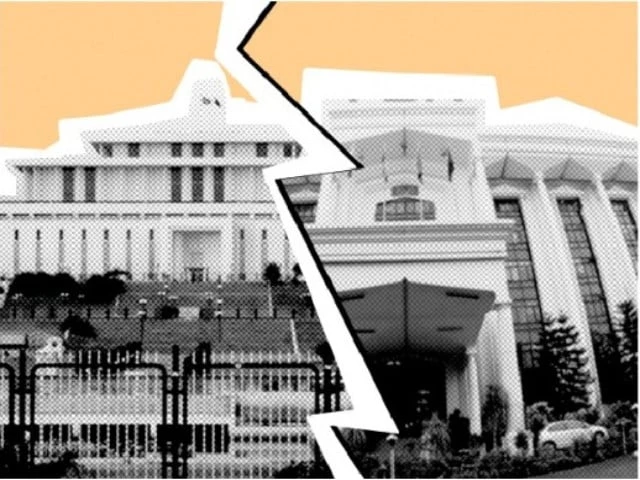President's orders face FBR challenge
Senate panel reviews dispute as FBR defends court stay on tax case

The President of Pakistan's Office said on Wednesday that the head of state's orders cannot be challenged in any court. The statement came after the Federal Board of Revenue (FBR) obtained a stay order from a provincial court against the President's decision in a tax matter concerning MH Traders.
The unique case shows state organs at odds. Chairman FBR Rashid Langrial repeatedly told the Senate Standing Committee on Finance that the FBR could not even think of challenging the President's orders.
Headed by Senator Saleem Mandviwalla, the committee took up the non-implementation of a Presidential order. The President's Office had issued the order in July this year, but the FBR did not enforce it.
"The orders of the President are absolute in nature and, being head of state, no agency or department can challenge them anywhere," said Zia Basit, Director General Legal at the President's Secretariat.
In July this year, the President's secretariat accepted the representation of MH Traders in a case of misclassification of imported goods. The FBR had classified the imported goods as polyester fabric, while the importer had declared them as artificial leather to be used in football manufacturing.
The importer went to the Federal Tax Ombudsman's Office, which rejected the application on grounds of jurisdiction. MH Traders, along with another importer, challenged the FTO's order before the President. The President set aside both the FBR's and the FTO's orders.
Last month, the FBR went to the Sindh High Court against the President's order and obtained a stay.
Langrial said the FBR did not challenge the order in the President's capacity as head of state. He said the FBR challenged it as an appellate authority that has quasi-judicial powers in tax matters.
"I do not know from where this quasi-judicial power concept came, as the President has absolute authority," said the Director General Legal.
In September last year, the President's secretariat wrote to the secretary to the prime minister. It sought clarity on enforcing the President's orders in representations against findings of the Ombudsman.
Subsequently, the Prime Minister's Office instructed the Law and Justice Division to issue directions to all ministries and divisions. They were told to strictly observe section 18 of the Federal Ombudsman Institutional Reforms Act, 2013 (FOIRA) when dealing with cases and appeals already decided by the Federal Ombudsman or the President as Appellate Authority.
It also instructed them to withdraw appeals and representations, if any, filed against orders of the Federal Ombudsman or the President. Such appeals were termed violative of section 18 of the Act.
In December, the Law Division issued binding orders to all ministries. On Wednesday, Basit produced these instructions before the Senate Standing Committee on Finance.
The Law Division stated that the provisions contained in section 18 of the Federal Ombudsman Institutional Reforms Act, 2013 should be strictly observed while dealing with cases and appeals that have already been decided by the Federal Ombudsman or the President as Appellate Authority. It also said that appeals and representations, if filed any, against orders of the Federal Ombudsman or the President should be withdrawn as being violative of section 18 of the Act ibid.
According to the FBR's written reply to the standing committee, M/s MH Traders imported goods declared as artificial leather under a concessionary tax regime for football manufacturing. However, Customs laboratory tests termed the goods "printed polyester fabric, not PU leather."
The FBR further stated that the importer was not registered as a manufacturer. Registration is a prerequisite to avail the concessionary import. The FBR decided to adjudicate the importer but instead of joining adjudication proceedings, the importer filed a complaint with the Federal Tax Ombudsman.
The FTO dismissed the complaint, citing lack of jurisdiction. The importer then filed a representation before the President of Pakistan.
The President's Office overturned the FTO's order and granted relief to the importer. However, the Collectorate of Customs challenged the President's order before the Sindh High Court, which granted a stay in favour of the FBR.
The FBR told the standing committee that the "President cannot assume jurisdiction when the FTO has expressly declined it." It said a misclassification order had already been issued against the importer, which the importer had challenged in the Customs Appellate Tribunal.
"Challenging the President's order in the instant case does not violate the Cabinet Division's instructions," the FBR said. "Those instructions only bar challenges where the President upholds the FTO's decision. Here, the President's order contradicts the FTO's decision."
But the DG Legal of the President's secretariat disclosed that the Cabinet's 2016 instructions, which allow the FBR to go to court when the FTO's and the President's orders contradict, had already been cancelled. He said fresh instructions of the Law Division bar such acts by the FBR.
The FBR stated that, if its stance is not accepted, the Customs Act of 1969 and allied laws would be rendered useless. Instead of following adjudication proceedings leading up to the Supreme Court of Pakistan at the appellate stage, traders would prefer to seek relief directly from the President's Office. That would create serious enforcement issues for the FBR's field formations across the country.
The FBR said MH Traders was operating only sewing and knitting machines for stitching clothes, with no evidence of football manufacturing.
The FBR chairman said the department had also sought clarification from the Office of the Attorney General for Pakistan. He said that, if the attorney general did not support the FBR's stance, the department would withdraw the case from the Sindh High Court.
The committee deferred the matter till the next hearing.























COMMENTS (2)
Comments are moderated and generally will be posted if they are on-topic and not abusive.
For more information, please see our Comments FAQ